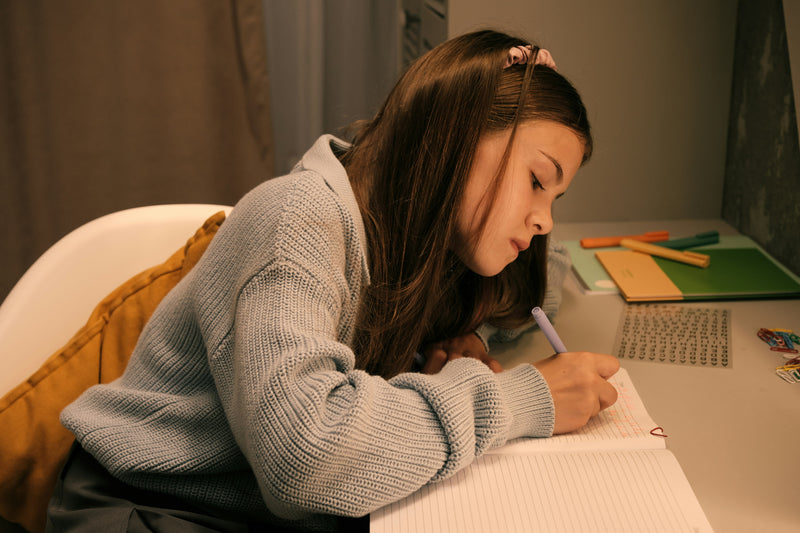
The Secret Superpower Hidden in a Simple Notebook: Why Journaling Transforms Young Minds 🦸♀️📔
Imagine discovering that your child possesses a superpower—one that could boost their confidence, enhance their creativity, improve their emotional regulation, and even make them better problem-solvers. The best part? This superpower doesn't require a cape, special training, or expensive equipment. It lives quietly inside a simple notebook, waiting to be unleashed through the magical practice of journaling. Yet despite its incredible benefits, this powerful tool remains one of childhood's best-kept secrets. Today, we're pulling back the curtain on why putting pen to paper might be the most transformative habit you can introduce to your child's daily routine. ✨🖋️
The Journaling Revolution: Why Every Child Needs This Superpower 🌟🚀
Let's start with some mind-blowing research that might just convince you to run out and buy your child a journal immediately:
- Children who journal regularly show 23% improvement in emotional regulation skills 😌🧠
- Young writers demonstrate significantly higher creativity scores on standardized assessments 🎨📊
- Kids who reflect through writing exhibit better problem-solving abilities in challenging situations 🧩💡
- Regular journaling correlates with improved self-confidence and self-awareness 💪🪞
- Children who write about their experiences show enhanced memory retention and learning 📚🔍
- Young journalists develop stronger communication skills both written and verbal 🗣️✍️
The Confident Mindset Journal harnesses these benefits through carefully crafted prompts that guide children toward building unshakeable self-confidence through reflection and self-discovery. 📔💫
The Magic Behind the Pages: How Journaling Rewires Young Brains 🧠⚡
Here's where things get really fascinating. When children put their thoughts on paper, something remarkable happens in their developing brains:
Neural Pathway Development 🛤️
Writing by hand activates multiple brain regions simultaneously, creating stronger neural connections than typing or thinking alone. It's like creating superhighways for thoughts and ideas!
Emotional Processing 💗
Journaling helps children externalize their feelings, making big emotions more manageable. Instead of emotions swirling chaotically inside, they become organized thoughts on paper.
Memory Consolidation 🧠💾
The act of writing helps transfer experiences from short-term to long-term memory, creating a personal archive of growth and learning.
Self-Reflection Skills 🤔✨
Regular journaling develops metacognition—the ability to think about thinking—which is crucial for emotional intelligence and decision-making.
Language Development 📝🗨️
Children naturally expand their vocabulary and improve their communication skills through regular writing practice.
The stories in the My Furry Soulmates series beautifully model characters who use reflection and introspection to navigate challenges, providing wonderful examples for children beginning their own journaling journey. 📚🦊
What Makes Journaling Different from School Writing? 🏫✍️
Many parents wonder: "My child already writes at school—why do they need to journal too?" The answer lies in understanding the fundamental differences:
School Writing:
- Has specific requirements and expectations ✅📋
- Often focuses on correctness over expression 🎯📏
- Usually written for teacher evaluation 👩🏫👀
- Limited topics and formats 📝🔒
- Emphasis on external standards 📊⚖️
Personal Journaling:
- Completely judgment-free zone 🚫⚖️
- Focuses on authentic self-expression 💫🎭
- Written for personal growth and discovery 🌱🔍
- Unlimited topics and creative freedom 🌈🎨
- Emphasis on internal exploration 🧭💭
The Curiosity Mindset Journal perfectly embodies this freedom, encouraging children to explore questions, wonder about the world, and follow their natural inquisitiveness without any pressure for "right" answers. 🔍🌟
The Incredible Benefits: What Journaling Unlocks for Children 🗝️🎁
Emotional Intelligence Boost 💝🧠
Journaling helps children identify, name, and understand their emotions. Instead of saying "I feel bad," they learn to distinguish between frustrated, disappointed, anxious, or sad—a crucial skill for emotional regulation.
Confidence Building 💪✨
When children write about their experiences, they often discover their own strength, resilience, and capability. Seeing their thoughts on paper validates their inner world and builds self-worth.
Problem-Solving Skills 🧩🔧
Writing about challenges naturally leads to brainstorming solutions. Children often surprise themselves by finding answers through the writing process.
Stress Relief and Anxiety Management 😌🌊
Journaling provides a healthy outlet for worries and fears. Many children find that writing about concerns makes them feel lighter and less overwhelmed.
Creativity Explosion 🎨🎭
Free-form writing unlocks imagination and creative thinking. Children discover they have stories to tell and unique perspectives to share.
Memory Preservation 📸💭
Journals become treasure troves of childhood memories. Children love rereading old entries and seeing how much they've grown and changed.
Goal Setting and Achievement 🎯🏆
Writing about dreams and aspirations helps children clarify their goals and track their progress over time.
The Kindness Mindset Journal specifically cultivates empathy and compassion through guided reflection, helping children develop deeper emotional intelligence and stronger relationships. 📔💕
Age-Appropriate Journaling: Starting Where Your Child Is 👶➡️👦➡️👧
Ages 4-6: The Picture Journal Era 🖍️🎨
- Draw pictures with simple words or dictated stories
- Focus on "What made me happy today?" 😊
- Use stickers, stamps, and colorful markers 🌈
- Keep entries very short and fun 📝
- Celebrate any mark-making as valid journaling ⭐
Ages 7-9: The Story Telling Phase 📖✍️
- Combine drawings with longer written descriptions 🖼️
- Explore "What I learned today" or "Something new I tried" 🌟
- Include favorite quotes or song lyrics 🎵
- Start simple gratitude lists 🙏
- Use prompts to spark ideas 💡
Ages 10-12: The Deep Dive Years 🏊♀️💭
- Longer, more reflective entries 📝
- Explore feelings and relationships more deeply 💗
- Set and track personal goals 🎯
- Include poetry, stories, or creative writing 🎭
- Begin processing more complex emotions 🌊
Common Journaling Myths: Busting the Barriers 🚫💥
Myth #1: "My child isn't a good writer" Truth: Journaling isn't about perfect writing—it's about authentic expression! Even scribbles and drawings count as valuable journaling. 🖍️✨
Myth #2: "We don't have time for journaling" Truth: Even 5-10 minutes of journaling provides significant benefits. Quality matters more than quantity! ⏰💎
Myth #3: "Children won't stick with it" Truth: When journaling feels fun and judgment-free, children naturally want to continue. The key is making it enjoyable, not mandatory! 🎉❤️
Myth #4: "Journaling is just for girls" Truth: All children benefit from self-reflection and emotional expression. Boys especially benefit from having a safe space to explore feelings! 👦💪
Myth #5: "My child will just complain or be negative" Truth: While children may initially write about problems, they quickly learn to process emotions and find solutions through writing! 🌈🔄
Making Journaling Irresistible: Fun Strategies That Work 🎯🎪
Create a Special Journaling Ritual 🕯️✨
- Choose a specific time each day (bedtime often works beautifully) 🌙
- Create a cozy journaling corner with soft lighting 🛋️💡
- Use special pens that are only for journaling 🖋️⭐
- Play gentle background music 🎵🎶
- Make it feel sacred and special, not like homework 🙏💫
Use Engaging Prompts 💡📝
- "If I could have any superpower, it would be..." 🦸♀️
- "The best part of my day was..." 🌟
- "I felt proud when..." 💪
- "Something that made me laugh today..." 😂
- "If I could talk to any animal, I would choose..." 🐾
Incorporate Creative Elements 🎨🖍️
- Include photos, ticket stubs, or small mementos 📸🎫
- Use colored pens, markers, or pencils 🌈✏️
- Add stickers or stamps to mark special entries ⭐🎯
- Create mind maps or doodles alongside writing 🧠🎭
- Include gratitude drawings or emotion faces 😊💗
Celebrate the Journey 🎉🏆
- Read favorite entries together (if child wants to share) 📖👂
- Notice and celebrate growth over time 📈🌱
- Create special bookmarks for completed journals 🔖✨
- Take photos of your child writing to capture the moment 📸💕
- Acknowledge the courage it takes to be honest on paper 💪❤️
The Confident Mindset Journal takes the guesswork out of prompts by providing carefully crafted questions that guide children toward building confidence through reflection. 📔🎯
The Science of Gratitude: A Special Journaling Superpower 🙏🔬
One particular type of journaling deserves special mention: gratitude journaling. Research shows that children who regularly write about things they're grateful for experience:
- 25% increase in overall happiness levels 😊📈
- Better sleep quality and duration 😴💤
- Improved relationships with friends and family 👫❤️
- Reduced symptoms of anxiety and depression 🌤️💚
- Enhanced resilience during difficult times 💪🌈
- Greater life satisfaction and optimism 🌟😌
The Kindness Mindset Journal incorporates gratitude practices alongside empathy-building exercises, creating a powerful combination for emotional growth. 📔🌺
Creating Lifelong Writers: The Long-Term Vision 📚🔮
When we introduce children to journaling, we're not just giving them a childhood activity—we're cultivating a lifelong practice that will serve them through every stage of life:
Academic Success 🎓📊
Students who journal regularly show improved writing skills, better critical thinking, and enhanced creativity in all subjects.
Emotional Resilience 💪🌊
Adults who learned to process emotions through writing as children have better stress management and emotional regulation skills.
Career Advancement 💼🚀
Clear communication and self-reflection skills developed through journaling become valuable professional assets.
Relationship Quality 💕🤝
People who understand their own emotions and can express themselves clearly build stronger, more authentic relationships.
Mental Health Protection 🧠🛡️
The habit of processing experiences through writing provides ongoing protection against anxiety, depression, and other mental health challenges.
Creative Expression 🎨✨
Many adult writers, artists, and innovators trace their creative confidence back to childhood journaling experiences.
By using tools like the Confident Mindset Journal, Curiosity Mindset Journal, Kindness Mindset Journal, and the stories in the My Furry Soulmates series, we provide children with the scaffolding to develop this transformative practice during its most formative period. 📚🧱
Starting Today: Simple Steps to Launch Your Child's Journaling Journey 👣🌱
Ready to unlock the power of journaling for your child? These simple steps will get you started:
- Choose the perfect journal together - Let your child pick one that feels special to them 📔✨
- Start with just 5 minutes - Consistency matters more than duration ⏰💎
- Create a cozy writing space - Make it feel sacred and inviting 🛋️🕯️
- Begin with simple prompts - "What made you smile today?" is perfect 😊📝
- Celebrate the process, not perfection - Every entry is a victory 🎉💪
- Model the behavior - Consider starting your own journaling practice 📖👨👩👧👦
- Use structured journals like the Confident Mindset Journal to provide gentle guidance and inspiration 🎯📔
Join Our Journaling Community! 💬✍️
How has journaling impacted your child's life? What strategies have worked best for getting started? Share your journaling success stories and challenges in the comments below! Let's inspire each other on this incredible journey of helping our children discover their inner voice and unlimited potential. 🌟👥
Remember: In a world full of external noise and digital distractions, journaling offers children something precious and rare—a quiet space to hear their own thoughts, honor their own experiences, and discover their own wisdom. When we give children the gift of journaling, we're not just teaching them to write—we're teaching them to think, to feel, to reflect, and ultimately, to become the most authentic, confident, and emotionally intelligent version of themselves. There may be no greater investment in their future happiness and success. ✨🌟



0 comments